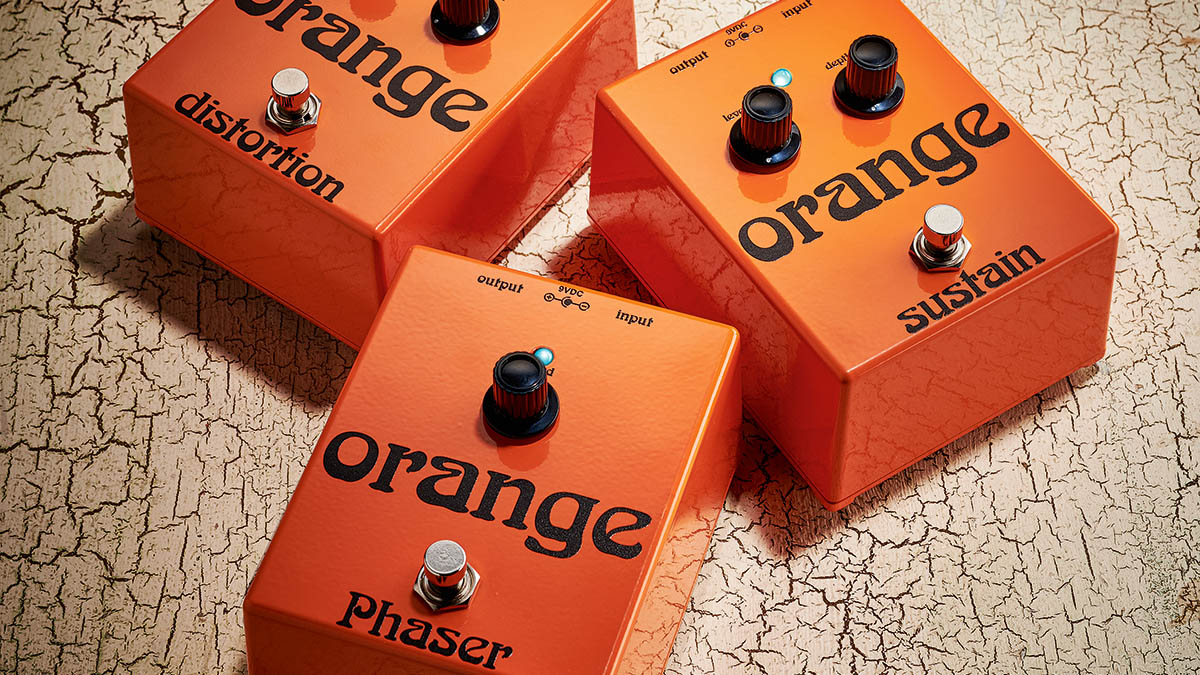MusicRadar Verdict
A welcome return for a series of long-lost pedals, tidied up and modernised but without losing that simplicity of design and vintage sounds that made them cult objects of desire for the pedalboard enthusiast.
Pros
- +
Simple designs and classic sounds.
- +
Low noise.
- +
Built like tanks.
Cons
- -
Quite bulky.
- -
More control over EQ would be helpful on the Distortion.
MusicRadar's got your back
Orange Vintage Series: What is it?
Orange Amps’ latest guitar effects pedals series arose out of stompbox archaeology and an internet discussion that asked the question of the storied British guitar amp brand to revive a trio of designs that enjoyed a mayflower existence in the 1970s.
The Orange Distortion, Phaser and Sustain found the brand’s chief designer Ade Emsely poring over old circuit diagrams and applying some modernisations across the board. Not that these modernisations are immediately obvious from a distance; the pedals’ robust and chunky aluminium enclosures suggest a secondary use as a doorstop, but up close you’ll see they have been adapted for using a regular 9V pedalboard power supply, and there are blue LEDs.
All inputs and outputs are located on the top of the units to help you position them on your ‘board. Further improvements have been made to reduce noise, with the Phaser notably deploying a JFET input buffer to cut down on the hiss that can get a little hectic when using the effect. The Phaser is true bypass, with the Sustain and Distortion pedals buffered
As for the sounds and the pedal’s designs, these are cribbed from old blueprints. Inside each of these big orange Orange boxes, each emblazoned with an art-nouveau-inspired typeface designed specifically for the brand by Richard Crediton-Hughes, you’ll find a circuit that revives an old-school and hitherto lost unicorn retro sound.
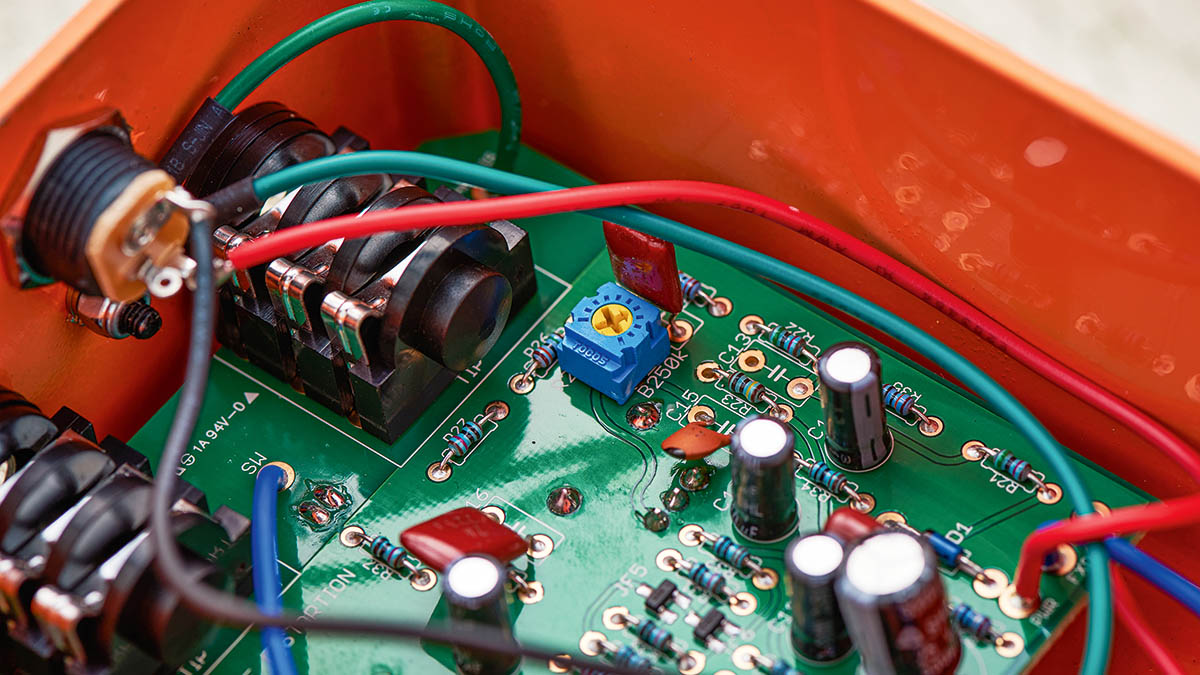
The Phaser takes its cues from the Phazer, its name updated to British English, its one-knob design offering the simplest of setups. It is a four-stage phaser – just turn the Speed dial to taste and you’re off to the races.
The Distortion might be inspired by the ‘70s design but it has an all-new circuit in which the back-to-back diodes have been swapped out for an amp circuit that uses a preset for bass and mids, with an internal trim pot for adjusting treble, with dials for Level and Depth controlling output volume and gain respectively.
Finally, Sustain is a smooth blooming optical compressor pedal that Orange says will act “as an overdrive for your clean tone” and promises a clean and transparent performance that can – as the name suggests – enhance sustain. As with the Distortion, there are controls for Level and Depth, with attack and release times preset.
Want all the hottest music and gear news, reviews, deals, features and more, direct to your inbox? Sign up here.
Orange Vintage Series: Performance and verdict
There is no question that these pedals are well put together. The aforementioned modernisations might have been much needed for them to compete with today’s stompboxes but little touches, such as the hard-wired footswitches – easily fixed and swapped out if one should ever need servicing – make these feel super sturdy and built to last.
They’re also built to evoke the past, and there is something classic about embracing nominative determinism to name an optical compressor Sustain. You’ll find unity gain when the Level control is set at 12 o’clock. Turning it past noon will give your amp something to think about, giving it a little boost if needed.
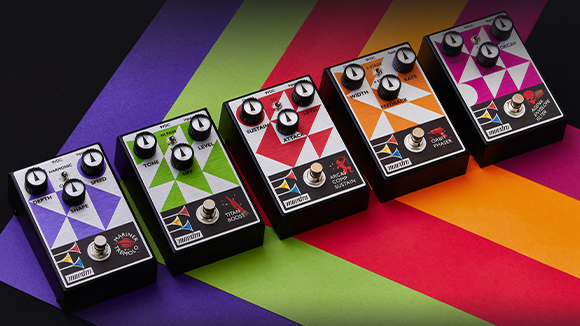
• Maestro Electronics Originals Collection 2
The second batch of stompboxes in Maestro’s resurrection picks up where the first left off, with some serious options for signal chain essentials such as compression and boost, with its tremolo, envelope filter and phaser all capable of some top-quality sounds.
• Orange Two Stroke
A brilliant combination of boost and EQ if you don't mind a slightly larger pedal.
• Orange Fur Coat
This is a fuzz for both the traditionalist and for the more experimental player, from Hendrix and other classic rock sounds of the late 60s/early 70s to the snot-nosed, up-yours, abrasive tones of latter-day noisemongers.
The Depth control is an all-encompassing sustain control that adjusts how the compression is applied. The compression is transparent; suitable for tidying up transients for country, sure, but as you turn it clockwise the attack eases off and your notes bloom nicely. Crank the Level and Depth and you can really push your amp and reassure you that the Sustain pedal is indeed well-named.
Orange embraces Henry Ford’s marketing ethos promising all kinds of dirt from the Distortion just so long as it’s vintage, and while that is true, this is a pedal that can be used in no shortage of settings, capable of adding some subtle grit, with the default EQ settings giving it a little bit of top-end sizzle, pushing your amp, through classic British-style amp gain.
Crunch through saturation, it’s all here, and if you’re happy with your amplifier’s gain and just want to give it a thump, do as you would on the Sustain pedal and set the Depth control low and dime the Level. Et voila! You’ve got yourself a clean boost.
The low-noise floor is superb, making for a simple yet practical modulation in an era where the phaser pedal – as with life itself – is getting more and more complicated
There is an impressive range on the Phaser, making it deceptively versatile. Set slow you can access that relaxed chew you’d hear on early Van Halen records or that rotating speaker vibe that blurs the lines between the modulation family. Set the pedal at its fastest and it compares favourably with a vintage MXR Phase 90 unit. These are the sorts of sounds that are benchmarks for any self-respecting ‘70s-style phase shifter. Orange is bang on the money here.
The low-noise floor is superb, making for a simple yet practical modulation in an era where the phaser pedal – as with life itself – is getting more and more complicated.
Simplicity is sometimes best. But when you’re recreating a vintage pedal experience, simplicity is crucial. While some might baulk at the bulk of the pedals, the hiss-free performance, the simple control setups and the quality sound allied to their retro cool should be enough to persuade many players to make some space for them.
MusicRadar verdict: A welcome return for a series of long-lost pedals, tidied up and modernised but without losing that simplicity of design and vintage sounds that made them cult objects of desire for the pedalboard enthusiast.
Orange Vintage Series: Hands-on demos
Orange Amps
Andertons
Pete Thorn
Orange Vintage Series: Specifications
Orange Distortion
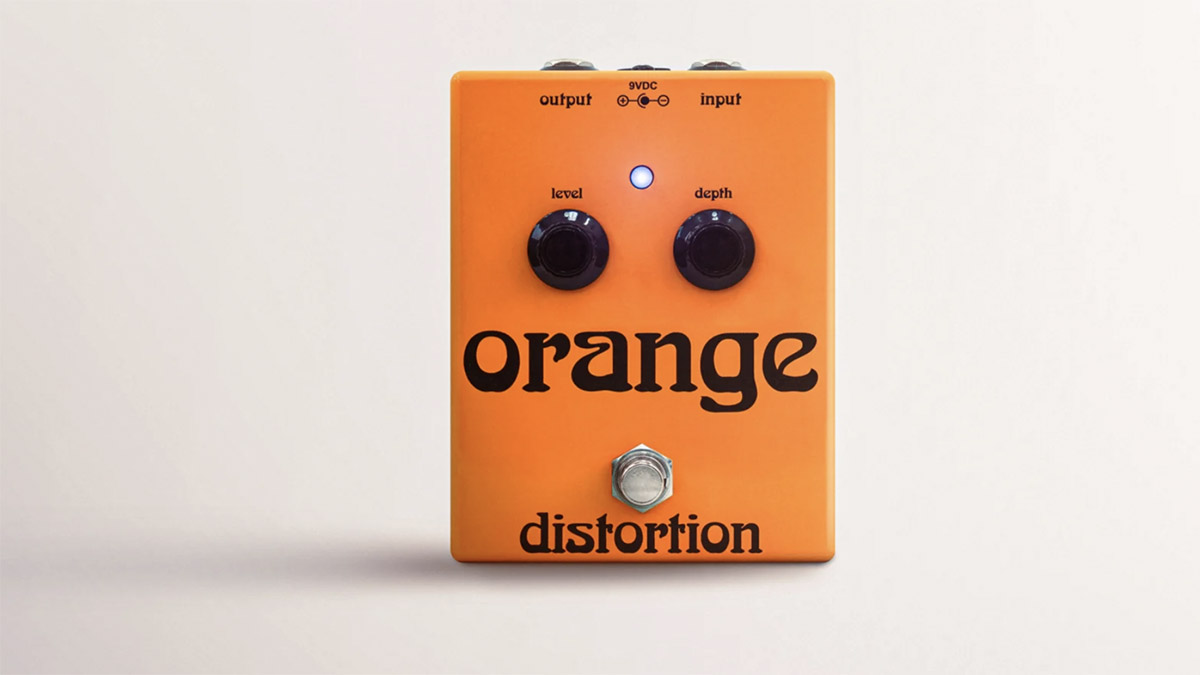
- ORIGIN: UK
- TYPE: Distortion pedal
- FEATURES: Buffered bypass, LED indication of gain reduction
- CONTROLS: Level, Depth, internal Treble trimmer, Bypass footswitch
- CONNECTIONS: Standard input, standard output
- POWER: 9V DC adaptor (not supplied) 3mA
- DIMENSIONS: 93 (w) x 120 (d) x 75mm (h)
Orange Phaser
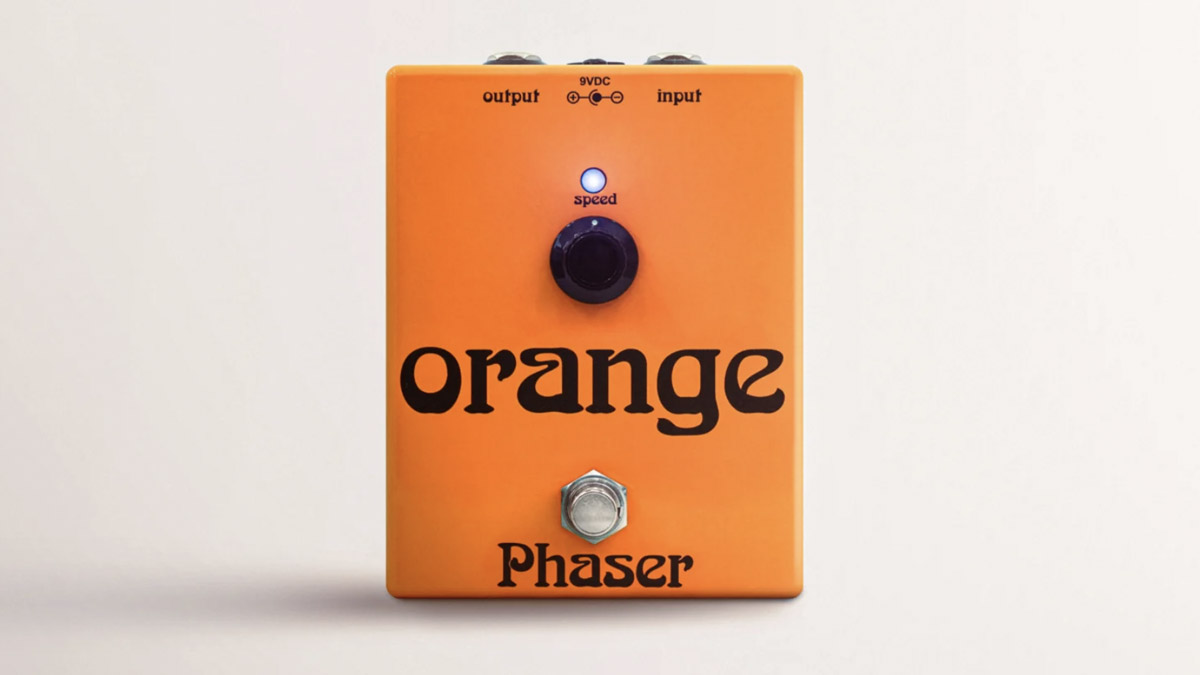
- ORIGIN: UK
- TYPE: Phaser pedal
- FEATURES: True bypass, LED indication of gain reduction
- CONTROLS: Speed, Bypass footswitch
- CONNECTIONS: Standard input, standard output
- POWER: 9V DC adaptor (not supplied) 17mA
- DIMENSIONS: 93 (w) x 120 (d) x 75mm (h)
Orange Sustain
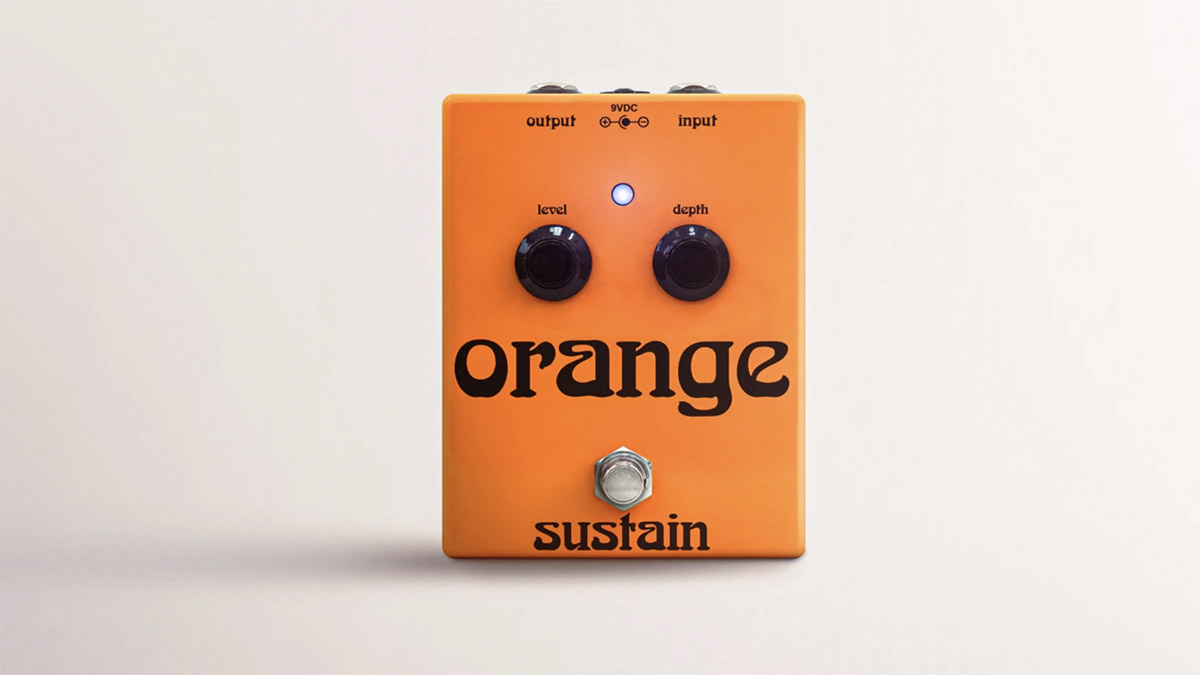
- ORIGIN: UK
- TYPE: Sustain pedal (compressor)
- FEATURES: Buffered bypass, LED indication of gain reduction
- CONTROLS: Level, Depth, Bypass footswitch
- CONNECTIONS: Standard input, standard output
- POWER: 9V DC adaptor (not supplied) 7mA
- DIMENSIONS: 93 (w) x 120 (d) x 75mm (h)
- CONTACT: Orange Amps
MusicRadar is the number one website for music-makers of all kinds, be they guitarists, drummers, keyboard players, DJs or producers...
- GEAR: We help musicians find the best gear with top-ranking gear round-ups and high-quality, authoritative reviews by a wide team of highly experienced experts.
- TIPS: We also provide tuition, from bite-sized tips to advanced work-outs and guidance from recognised musicians and stars.
- STARS: We talk to musicians and stars about their creative processes, and the nuts and bolts of their gear and technique. We give fans an insight into the craft of music-making that no other music website can.
